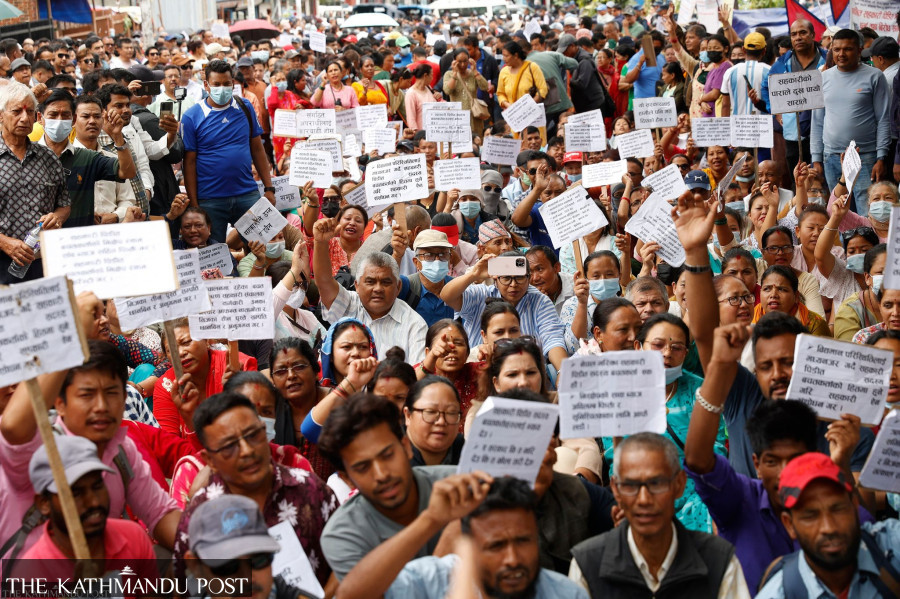National
Source a must to save over Rs1 million in a cooperative
New law prohibits depositors or borrowers from becoming members of more than one cooperative organisation.
Purushottam Poudel
With President Ramchandra Paudel issuing the Cooperatives Ordinance on Sunday, depositors will now have to disclose the source of the money if they are to save more than a million rupees in a cooperative.
The cooperatives will not deposit the money without disclosing its source, reads the ordinance.
Amending some Nepal laws on cooperatives, the Cabinet meeting of December 24 had decided to introduce an ordinance related to the cooperatives and forwarded it to the President. Paudel issued it on Sunday.
According to Shailaja Regmi Bhattarai, spokesperson for the Office of the President, the President issued the ordinance as per Article 114 (1) of the constitution on the recommendation of the Council of Ministers.
The new law prohibits members or borrowers from becoming members of more than one cooperative. However, this ordinance also makes it mandatory for a person who is a member of more than one cooperative organisation of the same nature at the time of its commencement to maintain membership in only one organisation.
The ordinance also classifies cooperatives at the federal, provincial and local levels and makes provisions for issuing loans accordingly, while the term of directors has also been reduced to two years.
With the ordinance in force, cooperatives that primarily engage in savings and credits will now have to protect savings by becoming a member of the Deposit and Credit Protection Fund.
The ordinance amends some clauses of the Cooperative Act-2017, the Rastra Bank Act-2002, while the Deposit and Credit Guarantee Fund Act-2016 has been revised too. As the winter session of Parliament is yet to start, these Acts were amended through an ordinance.
The ordinance also makes provisions for conciliation. “If a defendant is accused of embezzling the funds of a cooperative or defrauding the cooperative under Section 130 and a case is pending in court, any such criminal case can be conciliated under the prevailing law,” reads the ordinance. “A conciliation may be made if the member requests a settlement after the savings or embezzled funds have been returned.”
The ordinance also makes it clear that there is no scope for settlement in cases related to organised crime, money laundering, and other criminal offences where settlement is not possible under prevailing law.
The ordinance establishes a National Cooperative Regulatory Authority to regulate savings and credit cooperatives, abolishes the National Cooperative Development Board Act 1992, and mandates the return of up to Rs500,000 in depositor savings as a priority.
In the case of savings exceeding Rs500,000, the concerned organisation should make provisions for paying the member’s savings proportionally by setting standards if it is not possible to pay them at once.
After the disbanding of the National Cooperative Development Board, its movable and immovable assets and liabilities and employees will automatically be transferred to the authority, said Ganesh Prasad Bhatta, spokesperson for the Ministry of Land Management, Cooperatives and Poverty Alleviation.
“The National Cooperative Development Board had its limitations,” Bhatta added, “due to which it failed to address the issues related to the cooperatives under the country’s federal set-up.”
The authority will be able to address problems related to federal, provincial and local level cooperatives, Bhatta said.
It will also permit the sale of collateral to repay loans if borrowers fail to clear debts, ensure transparency in cooperative registration and classification, and regulate individual savings and credit limits.
According to the new provisions, the cooperatives can lease or sell assets to obtain funds for deposit repayments. These measures aim to protect depositors while promoting accountability in the cooperatives sector.
But Kashi Raj Dahal, the former chair of the Crisis-Ridden Cooperatives Management Committee, a government agency, says that while forming a regulatory authority is good in itself, its effectiveness depends on the government’s action.
The regulatory authority will address the problems that will arise in the future, but it remains to be seen how the problems faced by the current depositors will be solved, Dahal says.
“Those who embezzled cooperatives’ money might have sold their properties and fled the country,” Dahal says. “The government should be able to assure the depositors that their money is safe.”
The regulatory authority monitoring the three tiers of the cooperatives might face challenges in the future. “How will the government address the issue if a conflict of jurisdiction arises between the federal, provincial and local levels while monitoring the cooperatives? That should be clear at the outset,” Dahal cautioned.
Similarly, no cooperative will be able to lend more than 15 percent of its primary capital.
Maha Prasad Adhikari, the governor of Nepal Rastra Bank, has said that problems in the cooperative sector stem from unlimited collection of deposits.
Adhikari expressed this view during his meeting with the Parliamentary Special Investigation Committee led by Surya Thapa which also had lawmakers from the Nepali Congress, the CPN (Maoist Centre), the Rastriya Swatantra Party and the Rastriya Prajantra Party in July.
The probe committee had invited a wide range of persons to discuss measures to address the problem of cooperatives. Other issues pointed out during the discussions were lack of geographical boundaries of cooperatives, absence of an effective regulatory body, and poor supervision.




 23.12°C Kathmandu
23.12°C Kathmandu












